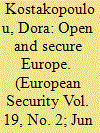| Srl | Item |
| 1 |
ID:
096955


|
|
|
|
|
| Publication |
2010.
|
| Summary/Abstract |
The EU as an area of "freedom, security and justice", faces a number of internal security concerns, such as organised crime, terrorism and illegal immigration which require external measures to combat them effectively. Limited progress has been made in the four dimensions of externalisation of EU internal security (the integration of internal security objectives into EU external relations strategy, cooperation with third countries, capacity building in third countries and common action within international organisations) and the EU must continue to expand its capabilities to use external measures to help solve internal security challenges. The Treaty of Lisbon and the 2010-14 Stockholm Programme are both likely to foster further externalisation of EU internal security objectives, but whether this becomes reality will depend to a large degree on the Commission's Action Plan.
|
|
|
|
|
|
|
|
|
|
|
|
|
|
|
|
| 2 |
ID:
101137


|
|
|
|
|
| Publication |
2010.
|
| Summary/Abstract |
he Lisbon Treaty's depillarisation of justice and home affairs (JHA) cooperation represents a major break from the past. It opens the way for the full involvement of the Commission, the European Parliament and the European Court of Justice, an involvement that is bound to influence the substantive scope, and perhaps liberalise, legal and policy output in the years ahead. A different form of cooperation in area of freedom, security and justice institutionally and substantively is digging out its space within the present, security-oriented and traditionally executive-driven architecture. The Stockholm Programme and the proposed Action Plan are a reflection of this. Present in them are aspects of the Hague Programme and the logic of control and surveillance. But there also exist vessels of less ideology-driven policies, pragmatic responses to JHA challenges and respect for citizens' rights, human rights and the rule of law. Whether the latter paradigm, which is wrapped up within the logic of security, remains confined and crammed in the next five years or will be given room to grow remains to be seen.
|
|
|
|
|
|
|
|
|
|
|
|
|
|
|
|